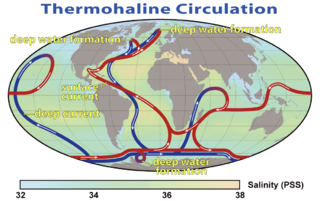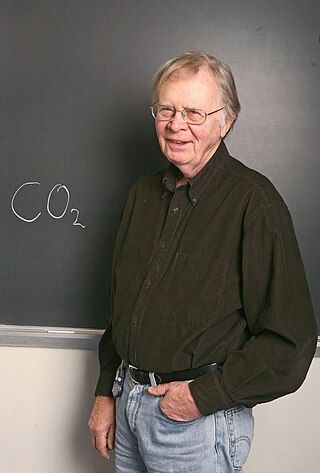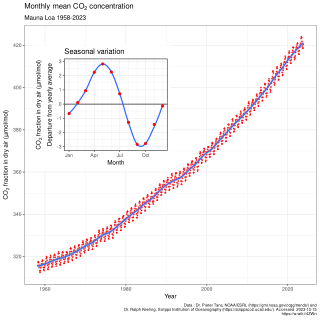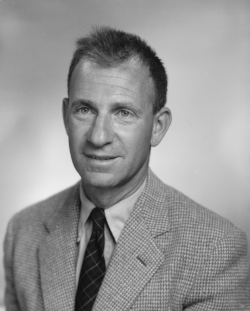
Thermohaline circulation (THC) is a part of the large-scale ocean circulation that is driven by global density gradients created by surface heat and freshwater fluxes. The adjective thermohaline derives from thermo- referring to temperature and -haline referring to salt content, factors which together determine the density of sea water. Wind-driven surface currents travel polewards from the equatorial Atlantic Ocean, cooling en route, and eventually sinking at high latitudes. This dense water then flows into the ocean basins. While the bulk of it upwells in the Southern Ocean, the oldest waters upwell in the North Pacific. Extensive mixing therefore takes place between the ocean basins, reducing differences between them and making the Earth's oceans a global system. The water in these circuits transport both energy and mass around the globe. As such, the state of the circulation has a large impact on the climate of the Earth.
The American Association of Petroleum Geologists (AAPG) is one of the world's largest professional geological societies with more than 40,000 members across 129 countries as of 2021. The AAPG works to "advance the science of geology, especially as it relates to petroleum, natural gas, other subsurface fluids, and mineral resources; to promote the technology of exploring for, finding, and producing these materials in an economically and environmentally sound manner; and to advance the professional well-being of its members." The AAPG was founded in 1917 and is headquartered in Tulsa, Oklahoma; currently almost one-third of its members live outside the United States.

The American Geophysical Union (AGU) is a 501(c)(3) nonprofit organization of Earth, atmospheric, ocean, hydrologic, space, and planetary scientists and enthusiasts that according to their website includes 130,000 people. AGU's activities are focused on the organization and dissemination of scientific information in the interdisciplinary and international fields within the Earth and space sciences. The geophysical sciences involve four fundamental areas: atmospheric and ocean sciences; solid-Earth sciences; hydrologic sciences; and space sciences. The organization's headquarters is located on Florida Avenue in Washington, D.C.

Wallace "Wally" Smith Broecker was an American geochemist. He was the Newberry Professor in the Department of Earth and Environmental Sciences at Columbia University, a scientist at Columbia's Lamont–Doherty Earth Observatory and a sustainability fellow at Arizona State University. He developed the idea of a global "conveyor belt" linking the circulation of the global ocean and made major contributions to the science of the carbon cycle and the use of chemical tracers and isotope dating in oceanography. Broecker popularized the term "global warming". He received the Crafoord Prize and the Vetlesen Prize.

William Aaron Nierenberg was an American physicist who worked on the Manhattan Project and was director of the Scripps Institution of Oceanography from 1965 through 1986. He was a co-founder of the George C. Marshall Institute in 1984.

Roger Randall Dougan Revelle was a scientist and scholar who was instrumental in the formative years of the University of California, San Diego and was among the early scientists to study anthropogenic global warming, as well as the movement of Earth's tectonic plates. UC San Diego's first college is named Revelle College in his honor.

Science journalism conveys reporting about science to the public. The field typically involves interactions between scientists, journalists and the public.
The Alexander Agassiz Medal is awarded every three years by the U.S. National Academy of Sciences for an original contribution in the science of oceanography. It was established in 1911 by Sir John Murray in honor of his friend, the scientist Alexander Agassiz.

Walter Heinrich Munk was an American physical oceanographer. He was one of the first scientists to bring statistical methods to the analysis of oceanographic data. Munk worked on a wide range of topics, including surface waves, geophysical implications of variations in the Earth's rotation, tides, internal waves, deep-ocean drilling into the sea floor, acoustical measurements of ocean properties, sea level rise, and climate change. His work won awards including the National Medal of Science, the Kyoto Prize, and induction to the French Legion of Honour.
Crude (2007) is a 90-minute-long feature documentary made by Australian filmmaker Dr Richard Smith attempting to explain the links between formation, extraction and refining as well the link between geology and economy. The film features interviews with oil industry professionals and geologists about the future of oil production and exploration. The interviewed include Dr. Jeremy Leggett, a geologist formerly working with oil exploration for BP and Shell; Dr. Colin Campbell, a retired British petroleum geologist who predicted that oil production would peak by 2007; Lord Ronald Oxburgh, former chairman of Shell; Professor Wallace S. Broecker at Columbia University; and journalist Sonia Shah.
Tony Bartelme, an American journalist and author, is the senior projects reporter for The Post and Courier in Charleston, South Carolina. He has been a finalist for four Pulitzer Prizes.

Andrew C. Revkin is an American science and environmental journalist, author and educator. He has written on a wide range of subjects including destruction of the Amazon rain forest, the 2004 Asian tsunami, sustainable development, climate change, and the changing environment around the North Pole. He is the founding director of the Initiative on Communication and Sustainability at The Earth Institute of Columbia University.

Heaven and Earth: Global Warming – The Missing Science is a popular science book published in 2009 and written by Australian geologist, professor of mining geology at Adelaide University, and mining company director Ian Plimer. It disputes the scientific consensus on climate change, including the view that global warming is "very likely due to the observed increase in anthropogenic (man-made) greenhouse gas concentrations" and asserts that the debate is being driven by what the author regards as irrational and unscientific elements.

Richard Arthur Lutz is an American marine biologist and deep-sea oceanographer. He is known for deep-sea research using the Alvin submersible, and is considered one of the world's foremost authorities on the ecology of deep-sea hydrothermal vents.
Usha Lee McFarling is an American science reporter who is an Artist In Residence at the University of Washington Department of Communication. She won a 2007 Pulitzer Prize for Explanatory Reporting. University of Washington Department of Communication.
Ralph Franklin Keeling is a professor at Scripps Institution of Oceanography. He is the Principal Investigator for the Atmospheric Oxygen Research Group at Scripps and is the director of the Scripps CO2 Program, the measurement program behind the Keeling curve, which was started by his father Charles David Keeling in 1958. Ralph Keeling has developed precise instruments and techniques for the measurement of atmospheric oxygen and anthropogenic CO2 in the ocean, and for the analysis of land and ocean carbon sinks.
The A.G. Huntsman Award for Excellence in the Marine Sciences was established in 1980 by the Canadian marine science community to recognize excellence of research and outstanding contributions to marine sciences. It is presented by the Royal Society of Canada. The award honours marine scientists of any nationality who have had and continue to have a significant influence on the course of marine scientific thought. It is named in honour of Archibald Gowanlock Huntsman (1883–1973), a pioneer Canadian oceanographer and fishery biologist.

"The Uninhabitable Earth" is an article by American journalist David Wallace-Wells published in the July 10, 2017 issue of New York magazine. The long-form article depicts a worst-case scenario of what might happen in the near-future due to global warming. The story was the most read article in the history of the magazine.

Amelia E. Shevenell is an American marine geologist who specializes in high-latitude paleoclimatology and paleoceanography. She is currently a Professor in the College of Marine Science at the University of South Florida. She has made notable contributions to understanding the history of the Antarctic ice sheets and published in high-impact journals and, as a result, was awarded full membership of Sigma Xi. She has a long record of participation in international ocean drilling programs and has served in leadership positions of these organizations. Shevenell served as the elected Geological Oceanography Council Member for The Oceanography Society (2019-2021).
Sort of Books is an independent British publishing house started in 1999 by Mark Ellingham and Natania Jansz, founders of the Rough Guides travel series. The company publishes both original and classic fiction and non-fiction titles: "The sort of books [readers] will want to discover and re-discover."











